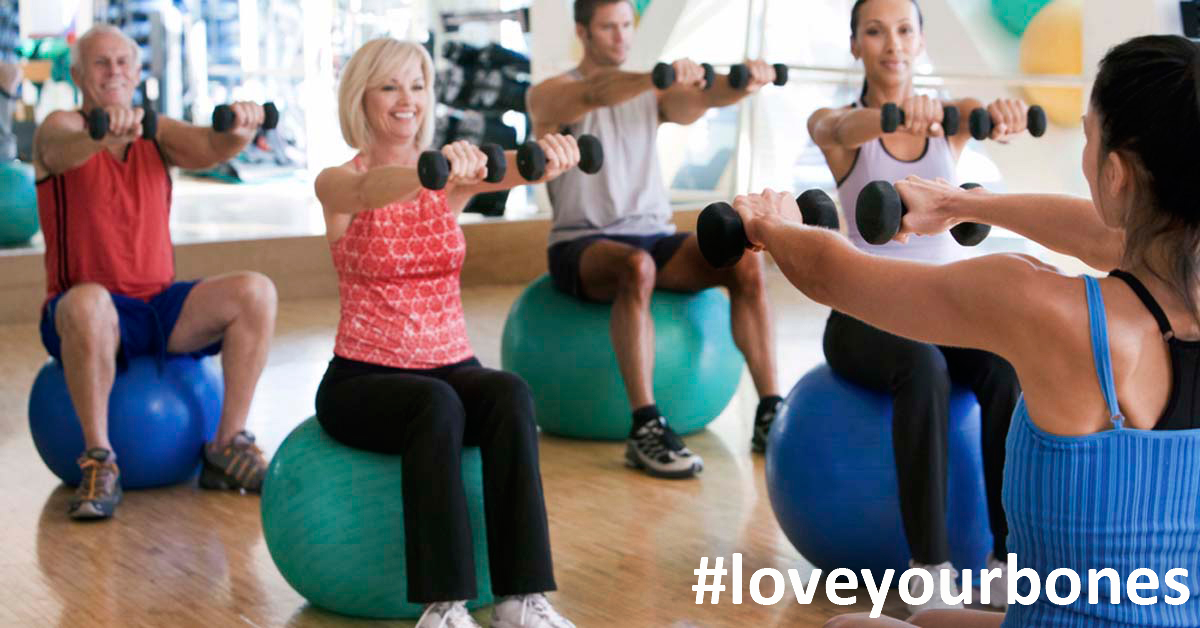We regularly publish some great healthy living tips, new recipes and other Prune tidbits on our blog
Bone Health
Love Your Bones
Posted Fri, Jun 11, 21 by Sunsweet
Prunes and Bone Health
Bone and teeth enamel are the hardest substances in the body, so what is available to keep them healthy and strong? Many people look after their teeth by brushing daily, but what about our bones? When thinking about improving your bone health your first thought probably isn’t to reach for prunes. However research is suggesting that prunes could in fact be beneficial for bone health, due to the nutrients they provide.

As with most dried fruit, prunes do not contain significant amounts of calcium (43mg/100g), which is commonly and correctly associated with bone health. However, prunes do contain vitamin K and manganese that among other functions have direct benefits for bone health. Prunes are high in vitamin K, which supports the maintenance of normal bones and helps with normal blood clotting. Prunes are also a source of manganese, which supports the maintenance of normal bones, and the formation of normal connective tissues (a structural part of bones).
If that isn’t enough to get you reaching for the prunes, they contain further beneficial nutrients. Prunes are a source of vitamin B6, which helps make healthy blood cells in our bone marrow and maintain normal hormone levels including those involved in bone health. Additionally, prunes are high in potassium, which helps your muscles work normally, and without our muscles we would not be able to move our bones. Prunes are a source of copper, which helps support normal iron transport in the body, helps maintain normal connective tissues (a structural part of bones), and plays a role in protecting cells within the body from oxidative damage. The human body is very complex with cells working together and separately to perform all our vital body processes and help us go about our daily lives. Our contribution to this is consuming a balanced and varied diet with adequate amounts of all essential nutrients, necessary for optimal body functions.
Our bones provide strength, support and protection to our bodies and help us carry out everyday tasks. Bones are a living tissue, which is continually growing and changing. Bones, become most dense in our early twenties, from then on the density starts to reduce (IOF 2015) so it is important to look after our bone health throughout life; to help maximise the density in childhood and then minimise the loss in adulthood. Reduction in density and quality of bone in turn increases the risk of fractures.
"Around the world, 1 in 3 women and 1 in 5 men are at risk of an osteoporotic fracture (IOF 2015)."
Often there are no signs or symptoms of osteoporosis until the first fracture which most commonly affects the hip, spine and wrist; and risk increases with age (IOF 2015). Fractures can affect quality of life, for example, following a hip fracture, only 40% of survivors return to their pre fracture walking ability (Sipila 2011). As walking is an important weight bearing exercise required for bone health, this may increase the risk of further fractures.
According to Hernlund (2013), 22 million women and 5.5 million men had low bone mineral density (BMD) or osteoporosis in the EU in 2010, with almost twice as many fractures occurring in women compared to men. Hormonal changes in postmenopausal women can increase bone loss and is a major health concern (Hooshmand 2014).
"The 2010 EU costs of osteoporosis, including 5% from pharmacological intervention, were estimated at €37 billion (IOF 2015)."
We know that following a bone friendly lifestyle can help maximise bone health- that means following a diet that is balanced and varied, alongside plenty of weight bearing activity such as walking, running, gardening, dancing and house work. Prunes can make a useful contribution to your diet, together with a variety of foods including sources of calcium such as milk and dairy products, and vitamin D, from oily fish (eg salmon and mackerel), eggs and sunlight*.
Learn More about Our Collaboration with the International Osteoporosis Foundation (IOF)
International Osteoporosis Foundation (IOF)
Sunsweet are partnering with the International Osteoporosis Foundation (IOF) as a Nutrition Sponsor to promote World Osteoporosis day. In collaboration with the IOF, we have prepared a number of PDF fact sheets which you can download from the bone health section of our website - For example our Love Your Bones brochure is filled with easy and practical bone friendly information; exercises, recipes and bone building tips for all the family.
Research
There are now a number of studies that have investigated the role of prunes in bone health and further research is currently being carried out to explore the mechanisms.
Strong bones help protect against osteoporosis so is there a potential link with prune consumption? Metti (2015) studied older, osteopenic, postmenopausal women who consumed 50g (5-6 prunes) or 100g (10-12 prunes) daily for 6 months (in addition to daily calcium and vitamin D supplements). The results indicate that both doses (50g and 100g) may benefit bone health by helping to slow bone loss, so this suggests that prunes are playing a role, but more research is needed to identify how prunes have this effect.
The increasing weight of evidence suggests prunes could be an effective fruit to help maintain bone health. Choosing to consume Sunsweet Californian prunes as part of a varied and balanced, and a healthy and active lifestyle could see further benefits than you first thought.
*for more information on how to protect your skin and eyes in the sun, visit http://www.nhs.uk/livewell/skin/pages/sunsafe.aspx
References:
Hernlund E, Svedbom A, Ivergard M, Compston J, Cooper C, Stenmark J, McClosky EV, Jonsson B, Kanis JA (2013) Osteoporosis in the European Union: medical management, epidemiology and economic burden. Arch Osteoporos. 8; 136.
Hooshmand S, Brisco JRY, Arjmandi BH (2014) The effect of dried plum on serum levels of receptor activator of NF-kB ligand, osteoprotegerin and sclerostin in osteopenic postmenopausal women: a randomised controlled trial. Br J Nutr. 112; 55-60.
Hooshmand S, Metti D, Kern M, Arjmandi H (2015) Dose response of dried plum on bone density and bone turnover biomarkers in osteopenic postmenopausal women. Presented at the International Symposium on the Nutrition Aspects of Osteoporosis, June 17-20, Montreal, Canada.
International Osteoporosis Foundation (2015) http://www.iofbonehealth.org/
Metti D, Shamloufard P, Cravinho A, Cuenca PD, Kern M, Arjmandi B, Hooshmand S (2015) Effects of low dose dried plum (50 g) on bone mineral density and bone biomarkers in older postmenopausal women. FASEB. 29; 738.12.
Sipila S, Salpakoski A, Edgren J, Heinonen A, Kauppinen M, Arkela-Kautiainen M, Sihvonen S, Pesola M, RantanenT, Kallinen M (2011) Promoting mobility after hip fracture (ProMo): study protocol and selected baseline results of a year-long randomized controlled trial among community-dwelling older people. BMC Musculoskeletal Disorders. 12: 277.
Love your bones – with a little help from Sunsweet!
Posted Fri, Jun 11, 21 by Sunsweet
World Osteoporosis Day (

Beautiful bones!
Most of us pay very little attention to our bones. And yet they provide us with strength, protect our bodies and help us carry out everyday tasks. Did you know that bones are a living tissue, continually growing and changing? They become most dense in our early twenties but then the density starts to reduce making it important to be mindful about bone health, throughout our lives.
Signs of osteoporosis
A first fracture - most commonly affecting the hips, spine or wrists – can often be one of the first signs of osteoporosis. Osteoporosis affects one in three women and one in five men aged 50 years and over. The condition causes bones to weaken and thus break more easily and can lead to serious pain and even long-term disability. Following a hip fracture, for example, only 40% of survivors return to their pre-fracture walking ability and because walking is an important weight-bearing exercise – crucial for bone health – this can exacerbate the condition. In severe cases, even sudden movements – like sneezing – can start to cause problems.
Hints and tips
The WOD’s official website offers the following five tips for healthy bones and a fracture-free future:
- Get regular exercise: Strengthening and weight-bearing exercises – like good old walking – are excellent options.
- Eat well: Ensure your diet includes plenty of bone-healthy nutrients like calcium and vitamin D. Snacking on nuts or dried fruit can help. And did you know that prunes contain vitamin K and manganese that - among other functions - have direct benefits for bone health?
- Cut out unhealthy habits: If you’re still overeating, smoking or drinking excessively, get the help you need and stop.
- Assess your osteoporosis risk: If it’s high, you might need prescription medication to protect you.
- And if you suspect that you’re high risk? Ask your doctor to run some tests so that you can get the treatment you need.
The role of prunes
Prunes provide a number of nutrients that contribute – in different ways - to bone health:
- Vitamin K supports the maintenance of normal bones and helps with blood clotting.
- Manganese also supports the maintenance of normal bones and helps form normal connective tissue (a structural part of bones).
- Vitamin B6 helps make healthy blood cells and maintain normal hormone levels.
- Copper helps support normal iron transport in the body and also helps maintain normal connective tissues.
If you’d like to know more, why not check out our Serve Up Bone Strength fact sheet?
Please Note: Prunes are good for digestion and help keep you
Simple steps to boost your bone health
Posted Thu, Oct 01, 20 by Sunsweet
October 20th is World Osteoporosis Day. Incredibly, some one in three women and one in five men will be affected by the disease during their lifetimes. Osteoporosis has a weakening effect on the bones and it can lead to painful fractures and even to severe disability. Organised by the International Osteoporosis Foundation (IOF), World Osteoporosis Day launches a rolling, year-long programme of activity to raise awareness of the condition and effect positive change for sufferers.

Maintaining strong and healthy bones, throughout your lifetime, is an excellent foundation for enjoying an active lifestyle well into old age. And simple steps like combining a good diet with weight-bearing exercise can help to boost bone health – whatever your age – and reduce the likelihood of developing osteoporosis in later life.
According to the IOF, micronutrients are substances - with ongoing research into their benefits – that can be important in maintaining bone health. The IOF actually recommend snacking on prunes because they are high in micronutrients, Vitamin K. And, on our website, we have recipes for some truly scrumptious prune-related treats. By tucking into delicious goodies like Prune Cookies, Creamy Vanilla Prune Popsicles and Prune Parfait, you'll be doing your tummy and your tastebuds a favour, as well as your bones!
Steps can be taken to prevent osteoporosis and the IOF, on the World Osteoporosis Day website, offer the following top tips for building strong bones:
- Regular exercise
- Bone healthy nutrients
- Avoid negative lifestyle habits
- Identify your risk factors
- Take osteoporosis medicine if prescribed
On the Sunsweet website – where you'll find the recipes for those super-tempting treats that we mentioned earlier - we have a section dedicated entirely to prunes and bone health. There really is a wealth of information including hints and tips for boosting bone strength and some important pointers from the IOF. Did you know, for example, that a 10% increase in peak bone mineral density - an indicator of strength - could delay the development of osteoporosis by up to 13 years?
From the Prunes and Bone Health section of our website, you can download informative and yet simple-to-read whitepapers on the following topics:
And, on the 8th October, we are delighted to be featuring an exclusive blog about the topic – appropriately entitled “Love Your Bones!”. The blog is certain to be an informative and enjoyable read so do make sure that you check it out.
PS: Don't forget to grab a few extra packs of those delicious Sunsweet prunes on your next shop, too!
The Benefits of Exercise and Bone Strength
Posted Fri, Jun 11, 21 by Sunsweet
Osteoporosis is a global issue, affecting up to one in three women and one in five men. Genetic factors have a role to play in determining an individual’s likelihood of developing osteoporosis but lifestyle factors also have an influence. Simple steps can be taken – like a routine of weight-bearing, muscle-strengthening exercise - to help improve bone-health.

But how prevalent is osteoporosis?
The condition causes bones to weaken so that they break more easily. According to the IOF, up to one in three women and one in five men (aged 50+) will suffer an osteoporotic fracture. These fractures can prove painful, cause long-term disability or even be life-threatening.
Can anything be done, to help prevent osteoporosis?
Although genetic factors do have a role to play in determining an individual’s likelihood of developing osteoporosis, lifestyle factors can also have an influence. And fortunately there are some simple steps that can be taken, to improve bone-health no matter what your gender, life-stage or bone-health status. These steps include:
- A routine of weight-bearing, muscle-strengthening exercise
- A balanced diet, rich in nutrients like calcium, protein and vitamin D
- Cutting out the cigarettes and limiting alcohol consumption
The role of exercise
Building and maintaining bone health is essential for both genders and at all life-stages. And exercise really is an excellent starting point, to build and maintain bone and muscle strength. Adults who get insufficient exercise lose bone density more quickly than their fit-as-a-fiddle counterparts. And sedentary older people are far more likely to suffer fractures. According to the IOF, this is because bones respond and strengthen when they are 'stressed' and the best way to achieve this? By getting plenty of weight bearing exercise.
What is weight-bearing exercise?
Weight-bearing exercise – the kind that’s good for your bones – is any form of exercise that requires you to work against gravity. Swimming and cycling, for example, would not be weight-bearing but good examples of weight-bearing activities include:
- Weight training
- Hiking
- Running
- Tennis
- Dancing
So, what are you waiting for? Your bones - not to mention the rest of your body - will thank you for a good-old workout.
And why are Sunsweet involved with the campaign?
Plenty of fruit and veg, as part of a nutritious diet, simple things that are bound to have a positive impact on overall health. And bone health is no exception. Did you know that prunes can be an ally when it comes to bone health management? Research suggests that the nutrients in them – things like vitamin K and manganese – can help to maintain normal bones. Yet more reasons to stock up on these tiny – and scrummy – nutritional power-houses!
More info:
If you’d like to find out more about bone health, please do take a look at the Prunes and Bone Health section of our website. Or visit our dedicated Bone Health library where you can download informative and yet simple-to-read whitepapers including the following:
- Love Your Bones! – Bone Health and Prunes
- Serve up Bone Strength – IOF Patient brochure
- IOF Fact Sheet
- Know Your Risk– IOF Patient brochure
Please Note: Prunes are good for digestion and help keep you regular, when 100g are eaten as part of a varied and balanced diet and an active lifestyle. Always consult a GP if you have any health concerns.





